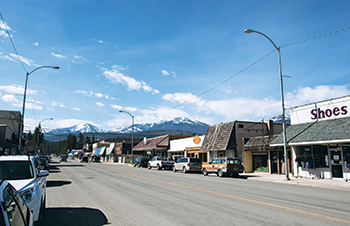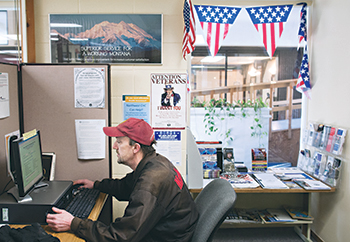LIBBY – Minutes before Kootenai Job Services opened on a recent Wednesday morning, locals were already gathered outside with their resumes and hopes in hand.
A 52-year-old who gave his name as “Chevy” said he’s a frequent visitor to the small office on Mineral Avenue, especially after he lost his job managing an apartment four months ago. Since then, he’s been sleeping on a friend’s couch.
“I lost everything all at once,” he said. “I do odd jobs here and there to make a buck here and there.”
Chevy moved to Lincoln County 14 years ago and has bounced between jobs ever since. He has found most of his work through word of mouth and, when someone hears about a job, people move fast. The opening rarely lasts.
When the doors opened, Chevy and a few others filed into the small office. Chevy saddled up to a computer and looked for work online, while others scanned the job board. Throughout the day, the stream of unemployed or underemployed remained constant. According to manager Johnette Watkins, an average of 105 people came into the job services office every day in January. Just over 2,600 people live in Libby and more than 19,000 reside in Lincoln County.
At the beginning of the year, Lincoln County’s unemployment rate hit 18 percent, the highest in three years. Even now, as warm weather provides construction and forestry jobs, the unemployment rate is stuck above 15 percent. The county’s rate is consistently three times higher than the state’s, which in February was 5.1 percent. For the last four years, the remote community in Northwest Montana has struggled to reverse jobless rates not seen since the early 1990s, when a series of mine and mill shutdowns sent the economy into a tailspin.
It’s gotten so bad that some, including Mark Lauer, who has lived in Libby almost his entire life, are beginning to look elsewhere for work. Lauer, 52, said if something doesn’t happen soon, he’s leaving.
“We’ve been beaten down,” he said. “Hard.”
Lauer still remembers the day in 1993 when he and his coworkers at the Montanore Mine were hiking out of the tunnel and were told that development would halt at the copper and silver mine south of Libby. At the time, more than two-dozen people worked there.
“It was just like any other day,” he said. “Then they just shut it down.”
The early 1990s were tough on Lincoln County. In 1990, the W.R. Grace & Co. asbestos mine closed. Then Noranda Minerals Corp. ceased work on the Montanore project because blasting was releasing chemicals into a nearby creek. The company walked away from the project a few years later because of plummeting minerals prices. In 1993, Asarco Mining closed the Troy Mine after producing copper and silver for more than a decade (it later reopened under new ownership). That same year, Champion International sold its Libby operations to Stimson Lumber Company, which closed all but one of the mills. The downsizing left more than 800 workers unemployed. The one remaining lumber mill limped on for another decade, before closing in 2003. More recently, the Troy Mine shut down in late 2012 due to rock falls and the 2013 closure of Stinger Welding Co. sent more shockwaves through the community.
 |
|
Downtown Libby. Greg Lindstrom | Flathead Beacon |
Watkins, who has lived in Libby since 1985, remembers the days following the mill downsizing in 1993. She was hired by Job Services to deal specifically with the influx of workers from the mill and said the community was in “crisis.” There was no way the local economy could absorb that many unemployed people, Watkins said.
Today, Lincoln County is a very different place than it was two or three decades ago, when the Libby Dam was being built and logging jobs were at an all-time high.
“The economy was flying back then,” Watkins said. “It was a lot different town.”
Terry Andreessen, owner of Timberline Auto Center in downtown Libby, has witnessed many of the changes. From his back office, cluttered with family photos, Andreessen said his dealership, once one of five in the county, is now the sole survivor. In the 1980s, the dealership would move 60 new and used cars a month; today it’s lucky to sell 25.
“We have to work our butts off just to pay the bills,” he said. “When you take away all those private sector jobs, you don’t have to be a genius to see what will happen. It’s destroyed this community. Families have lost their homes and their cars. They’re broken up because the father has to move away to find work.”
Andreessen blamed burdensome government and environmental regulations for the area’s economic woes. He’s not alone.
Lauer, who worked in the Troy Mine in the 1980s and on the Montanore project in the early 1990s, also criticized environmental rules that he believes are hurting places like Lincoln County.
“I know of no miner or logger in Lincoln County who would purposely screw up the environment,” he said. “That’s not how we do it here.”
Lauer has worked a series of odd jobs over the last 20 years, including a brief stint at the reopened Troy Mine in the mid-2000s. He and his family moved to the Seattle area for a few years, but they soon returned home to Lincoln County. “I couldn’t deal with the traffic,” he said, laughing.
In recent years, Lauer has worked seasonally for Environmental Restoration, a contractor for the Environmental Protection Agency’s Superfund cleanup, because of the county-wide asbestos contamination related to the former W.R. Grace vermiculite mine. He drives a water truck he purchased in hopes of fighting wildland fires. In the six years he’s owned it, the truck has spent six days working a fire, barely covering the original cost.
Every spring Lauer and dozens of others like him start working seasonal jobs that rarely cover the bills year round. At the end of the season, Lauer usually signs up for unemployment, but it rarely lasts the winter.
“My unemployment actually ran out two weeks ago, so I’m hoping the season starts soon because the bills keep coming,” Lauer said. “It’s tough to cram a year’s worth of wages in half a year.”
 |
|
Chevy, who declined to give his last name, searches for work at Kootenai Job Services in Libby. Greg Lindstrom | Flathead Beacon |
Ironically, while some people say the EPA cleanup has tainted Lincoln County’s and Libby’s reputations, Watkins said it has actually helped keep the local economy afloat due to the demand for workers. But as the cleanup wraps up, Watkins said the community must figure out what will take its place. She said there are some bright spots.
LiV Golf Cars plans to hire a half-dozen people this spring to construct golf cars at the Kootenai Business Park. Last month, the county sold the former Stimson Lumber finger jointer to two local businessmen who hope to restart the operation this year and employ 12 to 14 people.
There is even progress on the Montanore project, which Mines Management, Inc. of Spokane has been trying to open since 2005. On March 31, the U.S. Fish and Wildlife Service issued a long-awaited biological opinion stating the mine would not impact grizzly bears, Canada lynx or bull trout. Project consultant Eric Klepfer said the wildlife assessment paves the way for the U.S. Forest Service to issue a final environmental impact statement and draft record of the decision this fall. A final record of decision could be issued in early 2015, allowing the company to start hiring miners and return to the 14,000-foot mine tunnel that was abandoned two decades ago.
Chad Shilling, a professor of business at Flathead Valley Community College’s Lincoln County Campus, said light manufacturing companies, like the golf car company, and natural resource projects, like Montanore, will help diversify the economy.
The service industry is also growing as Lincoln County tries to bill itself as a recreational destination. Another potential boon to the local economy are retirees looking for a quieter and simpler life. Shilling said more medical jobs will crop up to cater to the aging population.
Many of those medical jobs are already here. On April 2, nearly one-third of the 66 openings posted at Kootenai Job Services were for places like Cabinet Peaks Medical Center, the Center for Asbestos Related Disease and the Libby Care Center. But those openings do little for guys like Lauer, whose experience is more industrial. For now, he’s stuck with seasonal work.
After years of working from season to season, check to check, Lauer said he and his family are accustomed to the lifestyle. He wishes that wasn’t the case, especially for his children. The youngest two, one in middle school and another just starting high school, have never gone on a family vacation.
If Lauer doesn’t find a full-time job this year, he plans on moving his water truck and his family south, “where the dust is always blowing” and there’s work. Hopefully.
“A lot of people probably think I’m crazy for staying this long, but it’s home. Even my wife asks ‘Why are we doing this?’ Because it’s home,” he said. “I’ve been a lot of places and I haven’t found a better place to live yet.”